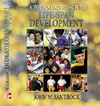|
 |  Life-Span Development: A Topical Approach John W. Santrock
The Life-Span Perspective Introduction
Chapter Outline- THE LIFE-SPAN PERSPECTIVE
- The Importance of Life-Span Development
- The Historical Perspective
- Child Development
- Adult Development
- Characteristics of the Life-Span Perspective
- II. THE NATURE OF DEVELOPMENT
- Biological, Cognitive, and Socioemotional Processes
- Periods of Development
- Prenatal Period to Late Adulthood
- Happiness Across the Life Span
- Conceptions of Age
- Developmental Issues
- Nature and Nurture
- Continuity and Discontinuity
- Stability and Change
- Evaluating the Developmental Issues
- III. THE SCIENCE OF LIFE-SPAN DEVELOPMENT
- Theories
- Psychoanalytic Theories
- Freud's Theory
- Erikson's Theory
- Evaluating the Psychoanalytic Theories
- Cognitive Theories
- Piaget's Cognitive Developmental Theory
- Vygotsky's Sociocultural Cognitive Theory
- The Information-Processing Approach
- Evaluating the Cognitive Theories
- Behavioral and Social Cognitive Theories
- Pavlov's Classical Conditioning
- Skinner's Operant Conditioning
- Social Cognitive Theory
- Evaluating the Behavioral and Social Cognitive Theories
- Ethological Theory
- Evaluating Ethological Theory
- Ecological Theory
- Evaluating Ecological Theory
- An Eclectic Orientation
- Research Methods
- Observation
- Interviews and Questionnaires
- Case Studies
- Standardized Tests
- Life-History Records
- Physiological Research and Research with Animals
- Correlational Research
- Experimental Research
- Time Span of Research
- Cross-Sectional Approach
- Longitudinal Approach
- Sequential Approach
- Cohort Effects
- Ethics
|
|
|



 2002 McGraw-Hill Higher Education
2002 McGraw-Hill Higher Education